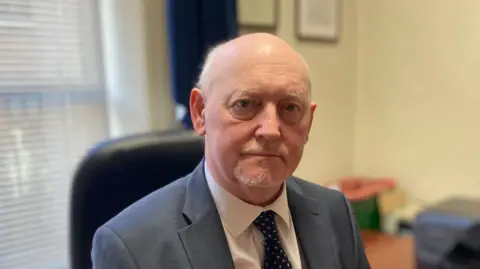Longer sentences needed for non-fatal strangulation, says victim
 BBC
BBCDonna Louise Todd is a mother, a businesswoman and an online influencer. She is also the victim of a violent man who strangled her and received a suspended sentence.
She said sentencing for non-fatal strangulation is too lenient, and in her case believes it "wasn't enough, justice was not served".
"For victims to go to court and for an abuser to get just a suspended sentence, it's unfair," she said.
The Lady Chief Justice told BBC News NI that "there is a perception amongst some that a suspended sentence is a 'let off', however, it acts as a deterrent measure", adding that there is a sentence "hanging over the offender which will be put into effect if they commit another offence".
Since 2020, 27 women have been violently killed in Northern Ireland.
Non-fatal strangulation, which became a stand-alone crime in Northern Ireland in 2023, is seen as a red flag for escalating violence in a relationship and an indicator for future risk of murder or attempted murder.
Strangulation is the second most common method of female murder in the UK, after stabbing.
'Enough was enough'
Donna Louise said her relationship, which lasted only six months, was both physically and emotionally abusive.
"It was challenging. It strips you down until there is nothing left and it's left me with a lot of trauma within that short space of time.
"I knew I had to call the police - enough was enough.
"I was scared to do so but it also was a way for me to completely disconnect with that person.
"It was the best thing I ever did."
He was charged with a number of offences, including non-fatal strangulation.
Donna Louise said she was prepared to give her witness testimony in court, but at the last minute her attacker changed his plea to guilty and was handed a suspended sentence.
"He admitted to what he'd done, and it was like a slap on the wrist," she said.
"I feel like, why was it not taken seriously?"
The Lady Chief Justice, Dame Siobhan Keegan, said: "The sentencing framework, within which all judges must act, is set in legislation by the Department of Justice."
In Donna Louise's case, the Lady Chief Justice said the judge "emphasised the deterrent measure of the suspended sentence by reminding the defendant that he would be sent to prison should he reoffend at any stage in the next three years".
 Queen's University Belfast
Queen's University BelfastThe Public Prosecution Service (PPS) made prosecution decisions in 278 cases of non-fatal strangulation from the beginning of April 2024 until the end of March 2025.
The vast majority of those cases were processed through the magistrates' court which has lower sentencing powers.
The PSNI have charged over 600 people with the offence since it came into force two years ago.
Dr John Taggart, a legal expert at Queen's University Belfast, said sentencing in Northern Ireland can be complicated.
"When judges come to sentence someone for a particular offence, for example non-fatal strangulation, they do have more discretion here, they aren't bound by formal guidance like in England and Wales," he told BBC News NI.
"That means judges do have a bit more leeway to perhaps incorporate aggravating factors or mitigating factors.
"The figures are clear that most of these cases are being tried in the magistrates' court compared to the crown court, significantly more cases in the magistrates', invariably that means that cases will attract a lower sentence."

Judge Barney McElhom, who retired this year after more than 25 years, described non-fatal strangulation as some perpetrator's "weapon of choice".
He said there has been "almost an explosion" in the number of cases he has seen in recent years.
Speaking to BBC Radio Foyle's North West Today programme, he said he's heard from victims that "this is the most frightening thing you can experience, it's like drowning".
"It's a very, very controlling and coercive and domineering tactic" which requires "wider awareness," he added.
Donna Louise said her message for others experiencing abuse is to "get out of that relationship", adding that she felt it was important to speak out.
"It's not easy, but I'll be a voice because I know what it feels like to lose your voice, to be silenced, and I will not be silenced."
